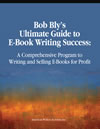Four Paths to Great Ideas for E-book Success

Bob Bly
Do you have a strong desire to write an e-book, but are stuck on coming up with a suitable topic? If your answer is “yes,” here are four ideas for e-books you could write:
1. Job Experience
An obvious source of book ideas is your job … even if you’re eager to leave that job behind. Thousands of excellent books have been written about skills, expertise, or experiences gained on the job.
This is how I came to write my first book, Technical Writing: Structure, Standards, and Style (McGraw-Hill).
My first job after graduating college was as a technical writer for Westinghouse Electric. After several months writing technical materials, I saw the need for a writing guide to assist technical writers with style, usage, punctuation, and grammar.
This was before e-books, so being book-minded, I went to the bookstores and found nothing.
My idea was for a style guide for technical writers modeled after The Elements of Style, by Strunk and White. I was extremely lucky: The first agent who saw Technical Writing agreed to represent the book. Within three weeks, he sold it to McGraw-Hill. The advance was $8,500 — not bad for a first-time author in 1981 for a short (100-page) book.
Have you developed specific and valuable skills (computer, selling, marketing, finance, negotiating, programming, etc.) others need to master? There's a need for a book telling how to do it.
2. Your Life Experiences
What’s happened to you hasn’t happened to others. Your experiences will make a book that’s instructive, entertaining, moving … or any combination of these.
This applies to everyone. For example, if you’ve chosen to remain single, you can write Living Alone and Loving It on the joys of being single. If you’re married with children, you have unique experiences as a parent. Share your knowledge and experiences.
If you’re married but unable to have children, you have credibility to write a book on infertility. If you haven’t had children by choice, you can write a book on Choosing to Live Child-Free.
My example: In 1982, the engineering firm employing me told me I’d have to relocate. My fiancée didn’t want to leave Manhattan. I resigned and started a new career as a self-employed writer.
The transition from employee to freelancer was educational. This experience, Out on Your Own: From Corporate to Self-Employment was published by Wiley.
3. Write About Something You Know How to Do
We’ve all done things other people haven’t. So, we know a lot more about these things than they do. The inexperienced would like to learn from your experiences … and avoid your mistakes.
For instance, after becoming a self-employed writer, I was forced to learn how to succeed in freelance writing on my own. No book existed to guide me. I made many expensive mistakes … and learned from experience.
To help other writers speed the learning curve and avoid mistakes, I wrote Secrets of a Freelance Writer (Henry Holt & Co.) The book explains running a freelance writing business, covering everything from getting started and finding clients to setting fees and negotiating contracts.
4. Writing About Your Hobby
Hobbies that fascinate you no doubt fascinate others. As a hobbyist, you have more knowledge than a journalist or other outsiders who’d have to research from scratch.
Turn your hobby into profit center by writing an e-book about it.
When I graduated college in 1979, I burned with desire to write a book and get it published. I started two book projects. One was a romance novel because I figured it would be easy to do. Wrong! I wrote 40 pages of the worst romance novel of all time before abandoning the project.
But writing those pages taught me an important lesson: Don't select a topic just because you think it’ll make you lots of money. If you do, your lack of enthusiasm will show through in your writing.
On the other hand, if you’re passionate about your topic, your enthusiasm shines through your writing. The book will be easier and more fun to write … and the final product, much better quality.
My second book project was a trivia book based on my passion for comic book super heroes.
I wrote a short manuscript and, having no contacts in publishing at that time, and no knowledge of the publishing business, sent it to editors at various publishers. It was rejected by all. I gave up and put it in a drawer. (This, too, was before e-books existed.)
Years later, I was cleaning out some files. I came across the manuscript. Instead of throwing it out, I mailed it to my agent.
Six weeks later, she'd sold the book. Citadel Press published Comic Book Heroes: 1,101 Trivia Questions About America's Favorite Superheroes from the Atom to the X-Men.
The lesson I learned from this experience: A book idea that doesn't sell now might sell later.
Eventually, a third lesson revealed itself: Every book published gives you credentials for more books in the same field.
Books about hobbies can be how-to, moneymaking, reference, specialized, or general information.
For example: If you’re interested in tropical fish, you could write How to Keep Tropical Fish (how-to), How to Breed Tropical Fish for Fun and Profit (moneymaking), An Illustrated Guide to Aquarium Fish (reference), Care and Breeding of Fancy Guppies (specialized), or Your First Fish Tank (general).
Tom Peeler writes in The Writer: "Concentrate on areas that interest you, and if you're not an expert now, you may become one. And even if the area of interest still requires consultation with recognized professionals, specialization will allow you to develop regular sources and will give you credibility with them."
The journey to e-book success begins with a single idea. Use one of these ideas to find one.

Bob Bly’s Ultimate Guide to E-Book Writing Success
Bob Bly shows you exactly how to build a six-figure passive income in under two years writing, publishing and selling your own e-Books. It’s the easiest, fastest, surest way to earn six figures.
Learn More »
You can do a minimum of writing by creating an ebook based on testimonials, information, and advice gleaned from friends,colleagues, and local experts (with permission of course). Topics are endless like childrearing or baby care tips, recipes and cooking shortcuts, caveats about car care, home maintenance, etc. Of course you'll need to organize and copy edit the content, but this is a pretty easy way to build a book.
ConnieMWT –
I thoroughly enjoyed reading this article on E-book success. Presently, I am re-structuring a book I wrote in the beginning of this century on a pillar of fasting. Your advice of not throwing away anything from the past writings has given me much encouragement to forge ahead with my book. Perhaps it will be an e-book. Thank you for the encouraging words in this article to keep writing.
Viola Gary
Aunti Vi –
Hi Will and Bob,you two have the greatest,of knowledge, of Copywriting,if anyone needs to know ,how to write an E-Book,they need to ask Will and Bob, of the AWAI Theam.
Darrick –